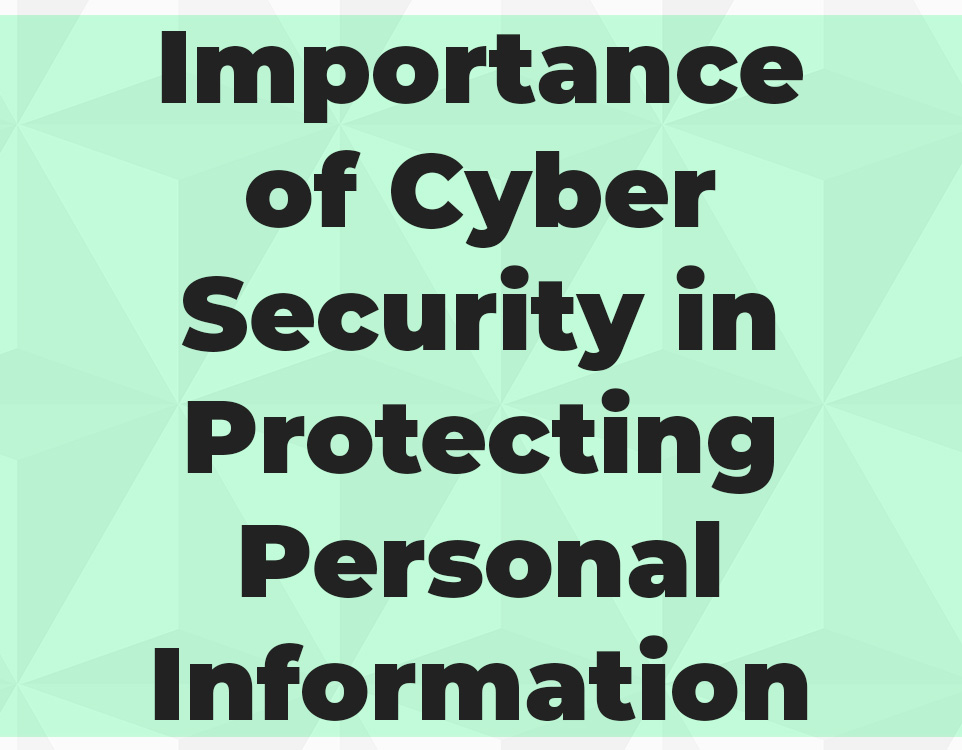
The world is becoming increasingly dependent on technology, which will only increase as we develop technologies that will link to our connected devices via Bluetooth and Wi-Fi in the future. But the risks of cyber exploitation are also increasing, and cybersecurity is a much-needed deterrent.
Cybersecurity protects web systems like computer systems, servers, mobile devices, and electronic systems from cyberattacks. Several cyber security solutions are needed to reduce online business risk as cyberattacks become more prevalent and sophisticated and organizational networks become more complicated.
Organizations usually have a framework for dealing with attempted or successful cyberattacks. A strong framework can assist in defending networks and systems, identifying threats, and recovering if an attack succeeds.
Cybersecurity is a necessity in the modern digital world, and a single security breach can expose millions of people’s personal information. Hence, having cyber security is essential to protect both individuals and businesses from spammers and cyber criminals.
The following are some cybersecurity strategies to solidify personal data protection:
Closely secure passwords: When creating a password, avoid using phrases or numbers that a cybercriminal may readily figure out, such as your birthday. Select mixtures of symbols, numerals, and letters in both lowercase and uppercase, and switch them up occasionally. Additionally, using the same password on several websites is not recommended; a password manager application can assist you in keeping track of your passwords.
Implement malware protection: Strong passwords alone are only sometimes sufficient. Because of this, activating malware protection is another crucial cybersecurity practice for both employees and normal users. Some experts claim that malware protection is quick to set up, simple to use, and capable of blocking almost all attacks.
The most frequent additional step malware protection adds is typically a one-time code texted to the user’s phone. Advanced malware protection options include fingerprint scanners and facial recognition software. Most internet packages include these functions, even if they are not utilized as frequently as they should be.
Protect privacy: Privacy is a legally protected fundamental human right. But did you know that in the age of the internet, the right to privacy is a basic human right?
At first, privacy meant that people should be able to live safely in their own houses without outside intrusion from the government. However, the meaning of “Privacy” has changed in the modern world. In the modern world, this implies that people need to be free to decide for themselves, speak openly, and conduct online searches without interference or harmful effects on their everyday life.
Stay up to date on computer security education: Computer security education is important in cyber security because knowledge is power. It is essential to provide corporate workers with training in the principles of computer security in order to increase their understanding of organizational procedures and policies, best practices for the industry, and methods for reporting and monitoring hostile activity. Courses, programs, and certifications relating to cyber security are covered in this subdomain.
Implement mobile protection: Mobile device protection refers to procedures aimed at safeguarding sensitive information kept on laptops, smartphones, tablets, wearables, and other portable devices. Preventing unauthorized individuals from accessing your corporate network is vital to mobile device security. This is an essential component of network security in the contemporary IT world. There are various methods available to safeguard mobile data by identifying threats, storing data, and preventing endpoint threats from infiltrating the corporate network.
Conduct risk assessments and determine vulnerabilities: The main goal of a risk assessment is to alert decision-makers to weaknesses in organizational systems so they may take preventative defensive measures and formulate strong risk responses.
The evaluation also includes an executive summary to assist executives in making educated judgments about ongoing security measures.
Cybercrime is any crime that takes place primarily or entirely online. Cybercriminals typically use computer networks or devices for their criminal acts. Security breaches and identity theft are some examples of cybercrime.
Individuals or groups of people can commit cybercrime. Some virtual criminals are well-organized, have extensive technical skills, and employ cutting-edge methods. Some hackers are newbies.
Here are some suggestions you may utilize to assist in safeguarding yourself against the variety of cyber-crimes that exist:
Conclusion
In the fast-developing digital world, cyber security is one of the most important components. It might defend you against malware, ransomware, viruses, data loss, or theft due to hacking, etc. For businesses, it can entail protecting themselves against financial crimes like employee theft or customers accessing company accounts without authorization and committing identity theft. A certificate course in cyber security can help you learn more about cyber security and how to combat cybercriminals. Doing so will help you succeed in the world of digital platforms.
FAQs:
Ans. The following are the critical cyber security skills one should possess:
Ans. Investing in cybersecurity has multiple benefits. Let’s check out some of them below:
Ans. With each passing day, new types of threats emerge. The following are the most common ones:
Ans. Cybersecurity’s current most important things are visibility, mitigation, prioritization, and encryption.
While strolling through social media platforms, especially Quora or LinkedIn, you might have stumbled upon…
Imagine you've just come from an exhausting gym routine and want to regain energy by…
SEO keeps changing, and it’s hard to keep up. Every year, new updates and trends…
What Is Retention Marketing and How Can Mobile Marketers Leverage It? In today’s competitive digital…
A state specifies the current running mode of the SQL database. There are seven main…
Twitter has 400 million active users. Getting popular on Twitter helps you grow your impact…
View Comments
I'd like to thank you for the efforts .thank you